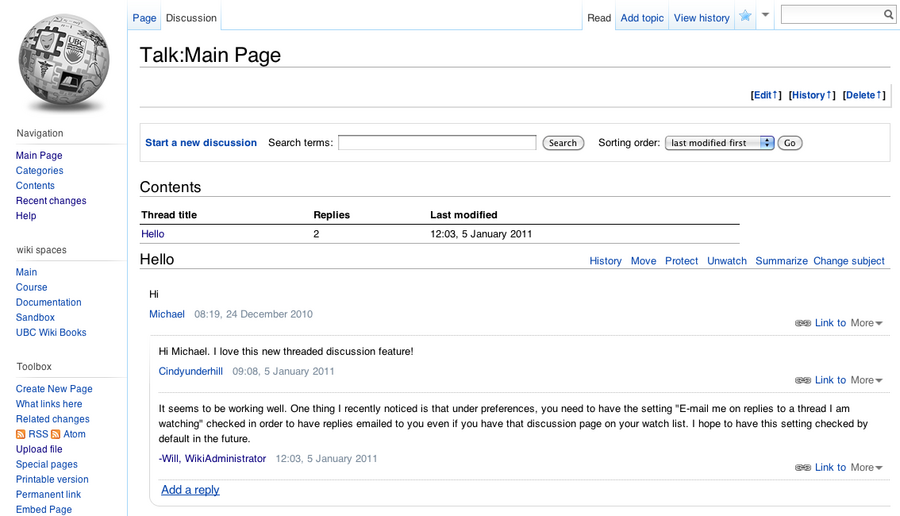Help:Talk pages
Every UBC Wiki page has an associated talk page which can be used for discussion and communicating with other users. Talk pages can be accessed by clicking the “discussion” tab at the top of the page.
Editing conventions on talk pages
As of 2011, the UBC Wiki is using a threaded "forum-style" format for the discussion pages. To start a new thread, click on the "Start a new discussion" link. To reply to a previous comment, simply click on the "add a reply" link in the appropriate thread.
Example
Here is an example discussion page. Note the "start a new discussion link" at the top and the "add a reply" link below the last comment :
Editing discussions
When using a discussion page, you can either start a new thread or reply to a previous existing comment. Comments are formatted using the same mark-up as used on the rest of the site. See Help:Formatting for more information on how to do such things as add links or bold text to your comments.
Your signature is automatically appended to your comment.

- Modify or edit comments
- Under the comment editing menu (a drop down list that appears when you click on the "more" link next to a comment) you can edit, delete, or move comments (for example, if you replied to the wrong thread). Note that good descriptive headings become important when many discussions start to fill the page.
- Move discussions to a different page
- If discussions are put in the wrong place on the wiki, and are better associated with different talk page, then you could just move the discussion by cut & paste. This is potentially confusing, for the people posting, but can be important for keeping things tidy. You could leave the discussion in the wrong place for a few days/weeks grace before tidying it. You could leave a link behind explaining that a discussion was moved, or if not, you should link within the edit summary.
- Delete discussions when they are out-of-date
- Discussions can often get left lying around on a talk page long after the issue is no longer relevant. It's usually a good idea to reply to saying "I think this is now resolved", but sooner or later it's time to just blow away the old discussions (they are of course preserved in the editing history).
- Split a post into several discussions
- It may be appropriate to do this, if somebody has raised several points which need to be answered separately. However you should always be respectful to other people's words. Does their post still make sense if you split it up?
Building articles - Discussing articles
It is usually best to keep focused on the task of building a wiki article, and use discussion pages only to support this process. The topic of conversation should generally revolve around what needs to be done to make the associated article better. Remember that editing the article itself is often a more effective means of communicating. It can be more difficult, requiring you to balance your views alongside those of others, but it can also be more rewarding. This is how the community of wiki editors will make progress. Often it will feel more natural to engage in heated debate on a talk page (or indeed any other contact channel) but in fact the wiki article itself can offer a powerful means of reaching middle-ground. Think about how to portray both sides of the argument (e.g. listing advantages and disadvantages) and you may find the debate evaporates.
User talk pages
A "User talk page" is a talk page associated with somebody's "User page" (See Help:User page). This is a place to leave messages for a particular wiki user.
This can function as a kind of messaging system. Users receive a prominent notification when new messages have been left on their talk page. They may be notified by email as well, although this cannot always be relied upon (since the email notification feature must be activated by supplying a valid email address, and clicking a confirmation link). If you don't get a response to your user talk page message, try looking for other contact details which they may have supplied on their user page.
Note that the messages are not private, and others can join in the conversation.
